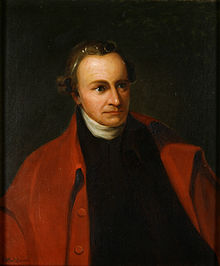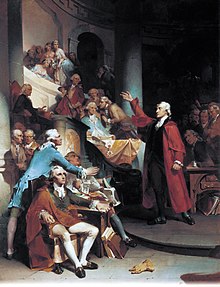This is an old revision of this page, as edited by Spobmur (talk | contribs) at 00:18, 11 March 2008 (Undid revision 197366945 by Spobmur (talk)). The present address (URL) is a permanent link to this revision, which may differ significantly from the current revision.
Revision as of 00:18, 11 March 2008 by Spobmur (talk | contribs) (Undid revision 197366945 by Spobmur (talk))(diff) ← Previous revision | Latest revision (diff) | Newer revision → (diff) For other people with this name, see Patrick Henry (disambiguation).| Patrick Henry | |
|---|---|
 | |
| 1st & 6th Governor of Virginia | |
| In office 1776 – 1779 1784 – 1786 | |
| Preceded by | First Governor Benjamin Harrison V (1784) |
| Succeeded by | Thomas Jefferson (1779) Edmund Randolph (1786) |
| Personal details | |
| Born | May 29, 1736 |
| Died | June 6, 1799(1799-06-06) (aged 63) |
Patrick Henry (May 29, 1736 – June 6, 1799) was a prominent figure in the American Revolution, known and remembered for his "Give me Liberty, or give me Death!" speech. Along with Samuel Adams and Thomas Paine, he was one of the most influential (and radical) advocates of the American Revolution and republicanism, especially in his denunciations of corruption in government officials and his defense of historic rights.
Biography
Born in Hanover, Virginia to an immigrant father from Aberdeenshire and mother of English descent, Henry trained as an attorney, and noted for his heated oratorical skills, this Virginian first made a name for himself in a case dubbed the "Parson's Cause" (1763), which was an argument on whether the price of tobacco paid to clergy for their services should be set by the colonial government or by the Crown. Henry technically lost the case, but damages were set at such a nominally low level that the result was widely perceived to be a victory for the independence movement. Perhaps in part because of his success in this venture, Henry was elected to the House of Burgesses (the legislative body of the Virginia colony) in 1765. That same year, he proposed the Virginia Stamp Act Resolutions. The freshman representative waited for an opportunity where the mostly conservative members of the House were away (only 24% was considered sufficient for a quorum). In this atmosphere, he succeeded, through much debate and persuasion, in getting his proposal passed. It was possibly the most anti-British (many called it "treasonous") American political action to that point, and some credit the Resolutions with being one of the main catalysts of the Revolution. The proposals were based on principles that were well established British rights, such as the right to be taxed by one's own representatives. They went further, however, to assert that the colonial assemblies had the exclusive right to impose taxes on the colonies and could not assign that right. The imputation of treason is due to his inflammatory words, "Caesar had his Brutus; Charles the First his Cromwell; and George the Third—" "George the Third may profit by their example. If this be treason, make the most of it."

According to biographer Richard Beeman, the legend of this speech grew more dramatic over the years. Henry probably did not say the famous last line of the above quote, i.e. "If this be treason, make the most of it." The only account of the speech written down at the time by an eyewitness (which came to light many years later) records that Henry actually apologized after being accused of uttering treasonable words, assuring the House that he was still loyal to the king. Nevertheless, Henry's passionate, radical speech caused quite a stir at the time, even if we cannot be certain of his exact words.
Give me Liberty, or Give me Death
Main article: Give me Liberty, or give me Death!Patrick Henry is perhaps best known for the speech he made in the House of Burgesses on March 23, 1775, urging legislature to take military action against the encroaching British military force. The House was undecided as to whether to send troops or not, but was leaning toward not committing troops. As Henry stood in Saint John's Church in Richmond, Virginia, he ended his speech with his most famous words:
- Is life so dear, or peace so sweet, as to be purchased at the price of chains and slavery? Forbid it, Almighty God! I know not what course others may take; but as for me, give me liberty or give me death!
The crowd jumped up and shouted "To Arms! To Arms!". Problematically, the text of this speech did not appear in print until 1817, in the biography Life and Character of Patrick Henry by William Wirt. Although Wirt assembled his book from recollections by persons close to the events, some historians have since speculated that the speech, or at least the form with which we are familiar, was essentially written by Wirt decades after the fact.
Furthermore, other historians note that the speech may stand in contrast to this excerpt from his January 18, 1773 letter to Robert Pleasants, referencing his status as a slave-owner:
- Would anyone believe I am the master of slaves of my own purchase! I am drawn along by the general inconvenience of living here without them. I will not, I cannot justify it. However culpable my conduct, I will so far pay my devoir to virtue as to own the excellence and rectitude of her precepts, and lament my want of conformity to them.
American Revolution
Early in the Revolutionary War, Henry led militia against Royal Governor Lord Dunmore in defense of some disputed gunpowder, an event known as the Gunpowder Incident. During the war, he served as the first post-colonial Governor of Virginia, from 1776-79, an office he held again from 1784-86.
After war years
After the Revolution, Henry was an outspoken critic of the United States Constitution and urged against its adoption, arguing it gave the federal government too much power. As a leading Antifederalist, he was instrumental in forcing the adoption of the Bill of Rights to amend the new Constitution. He became a strong opponent of James Madison. By the late 1790s he was a prominent Federalist in support of Washington and Adams. The irony is that most of his followers became Republicans who supported Jefferson's party. President George Washington offered him the post of Secretary of State in 1795, which he declined. In 1798 President John Adams nominated him special emissary to France, which he had to decline because of failing health. He strongly supported John Marshall and at the urging of Washington stood for the House of Delegates in 1799 as a staunch Federalist. He especially denounced the Virginia and Kentucky Resolutions, which had been secretly written by Jefferson and Madison, and approved by the legislatures of those two states. He warned that civil war was threatened because Virginia, "had quitted the sphere in which she had been placed by the Constitution, and, in daring to pronounce upon the validity of federal laws, had gone out of her jurisdiction in a manner not warranted by any authority, and in the highest degree alarming to every considerate man; that such opposition, on the part of Virginia, to the acts of the general government, must beget their enforcement by military power; that this would probably produce civil war, civil war foreign alliances, and that foreign alliances must necessarily end in subjugation to the powers called in." He was elected to the House of Delegates, but died three months prior to taking his seat.
He died at Red Hill Plantation, Virginia, in 1799 at the age of 63.
Family
Patrick Henry's sister was the grandmother of Confederate General Joseph E. Johnston, and the great-grandmother of John Warfield Johnston (a nephew of General Johnston). Henry himself was the grandfather of Virginia representative and senator William H. Roane.
Henry married Sarah Shelton in 1754. From this marriage there were 6 children: Martha (1755 - 6 June, 1799), John (1757 - 1791), William (1763 - 1798), Anne (19 July, 1767 - 22 May, 1799), Elizabeth (23 April, 1769 - 14 September, 1842), Edward (1771 - 28 October, 1794).
Sarah died in 1775 and on 25 October, 1777 Patrick Henry married a second time to Dorothea Dandridge (25 September, 1755 - 14 February, 1831). From his marriage there were 11 children: Dorothea Spotswood (20 October, 1788 - 17 June, 1854), Sarah Butler (4 January, 1780 - 10 December, 1856), Martha Catharina (3 November, 1781 - 22 May, 1801), Patrick Jr. (15 August, 1783 - 22 September, 1804), Fayette (9 October, 1785 - 16 March, 1813), Alexander Spotswood (2 June, 1788 - 6 January 1854), Nathaniel West (7 April, 1790 - 6 September 1851), Richard (27 March, 1792 - 24 August,1793), Edward Winston (21 January, 1794 - 12 October 1872), John (16 February, 1796 - 7 January, 1868), Jane Robertson (15 January, 1798 - 19 January, 1798).
Henry's second wife was a granddaughter of Virginia Governor Alexander Spotswood and was related to Martha Washington.
Monuments and memorials
- His home and gravesite has been designated Red Hill Patrick Henry National Memorial.
- The United States Navy submarine USS Patrick Henry (SSBN-599)
- The CSS Patrick Henry of the Confederate Navy were named in his honor, as was the first World War II Liberty ship, the SS Patrick Henry.
- Emory & Henry College in Emory, Virginia
- Eight high schools (including three in Virginia, more than for any other person in the Commonwealth)
- Patrick Henry College in Purcellville, Virginia is also named in his honor.
- The Patrick Henry Boys and Girls Plantation was established as a living legacy to Patrick Henry on property near his grave site donated by the Red Hill Patrick Henry National Memorial. It is a Christian residential facility for at risk youth.
- Henry helped to establish the Hampden-Sydney College in Virginia. It is the 10th oldest institution of higher education in the United States. Six of Patrick Henry's sons graduated from Hampden-Sydney. Future United States president William Henry Harrison also graduated from the College in 1791.
- Other places named in honor of Patrick Henry include:
Notes
- "Patrick Henry Timeline". Patrick Henry National Memorial. Retrieved 2007-11-28.
- wc.rootsweb.com
- Ray Raphael, Founding Myths
- James W. Loewen, Lies My Teacher Told Me
References
- Beeman, Richard R. Patrick Henry: A Biography. New York: McGraw-Hill, 1974. ISBN 0-07-004280-2.
- Bernard Mayo; Myths and Men: Patrick Henry, George Washington, Thomas Jefferson (1959)
- Loewen, James W.; Lies My Teacher Told Me: Everything Your High School History Textbook Got Wrong, New York: The New Press, 1995, ISBN 1-56584-100-X; Simon and Schuster, 1996, ISBN 0-684-81886-8.
- Moses Coit Tyler. Patrick Henry 1898.
See also
External links
- Works by Patrick Henry at Project Gutenberg
- Quotations by Patrick Henry at Liberty-Tree.ca
- Hanover County, Virginia, birthplace of Patrick Henry and location of the Hanover Tavern, where Henry lived and worked early in his life, and Hanover Courthouse, where the Parson's Cause case was argued in 1763.
- Scotchtown Plantation, Henry family home from 1771 - 1778 ,
- St. John's Church (Richmond, Virginia), where Henry delivered "Liberty or death" speech in 1775
- Text of 1775 "Liberty or death" speech
- Red Hill Plantation (Charlotte County, Virginia), Henry's final home and burial place
- Address opposing US Constitution
- Patrick Henry at Find-A-Grave
- Patrick Henry Letters
| Preceded byEdmund Pendleton | Governor of Virginia 1776–1779 |
Succeeded byThomas Jefferson |
| Preceded byBenjamin Harrison V | Governor of Virginia 1784–1786 |
Succeeded byEdmund Randolph |
- Pendleton was President of the Committee of Safety which had power after the colonial governor fled.


